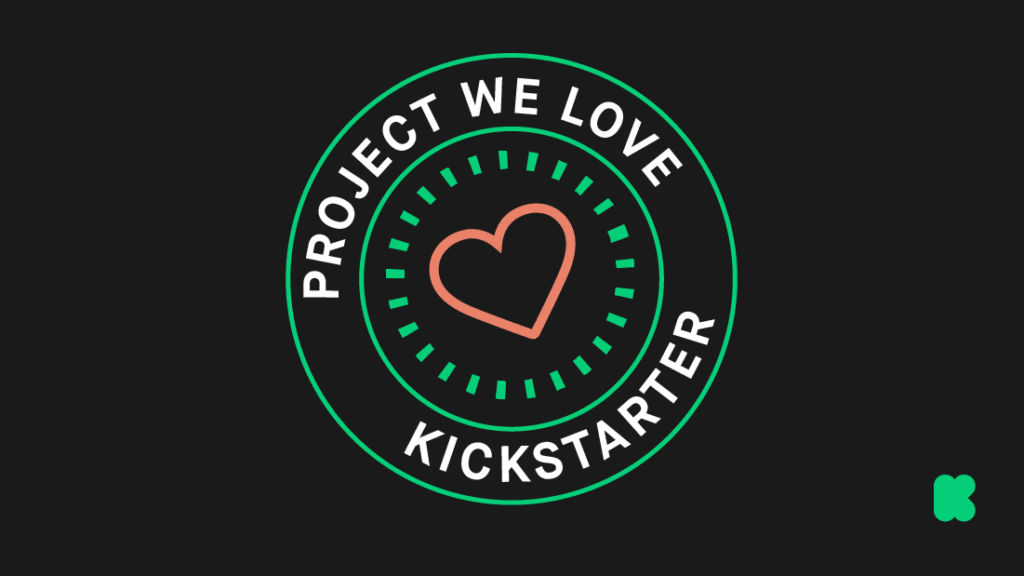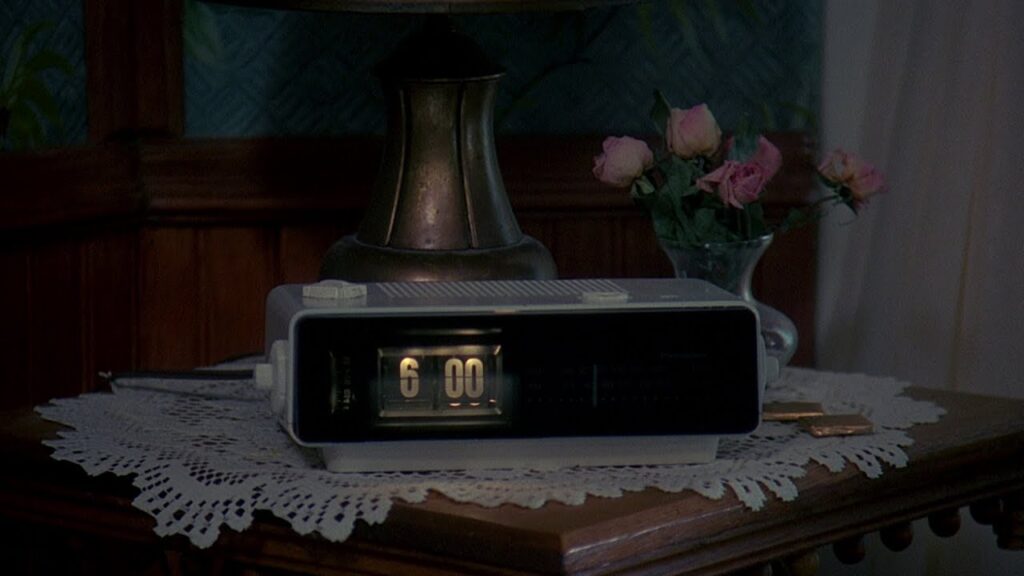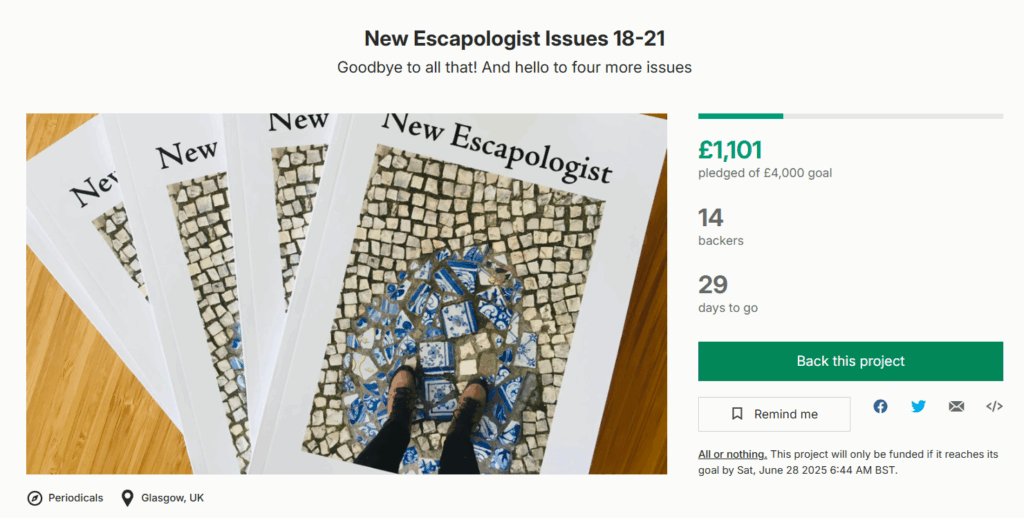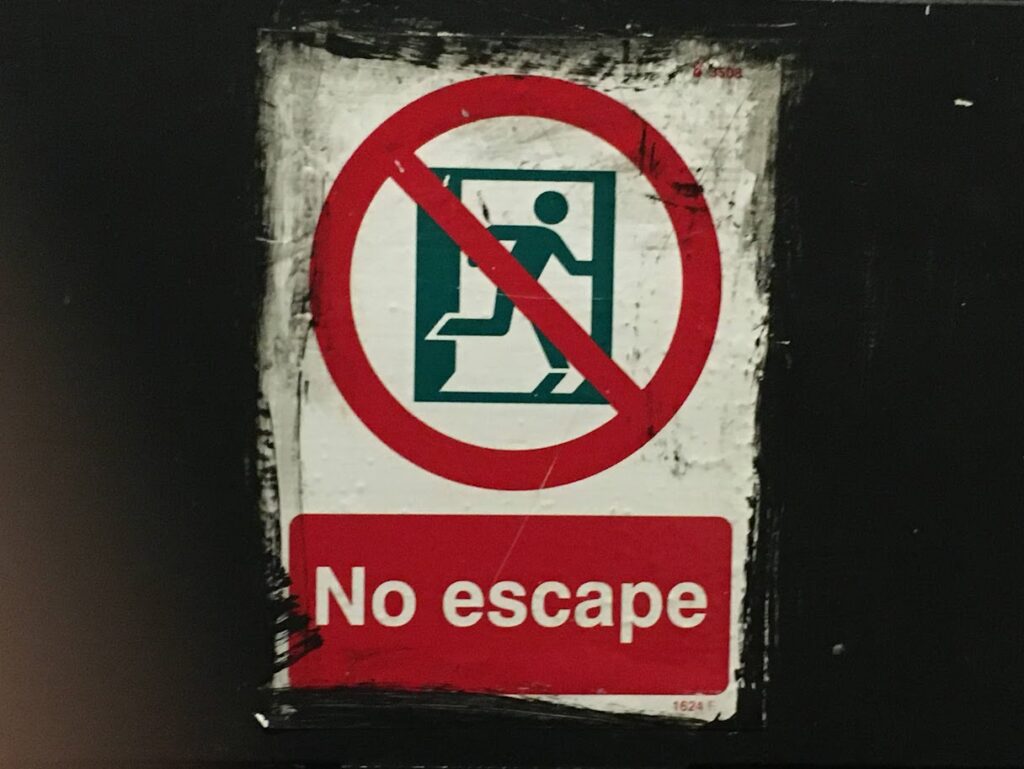An Escapologist’s Diary: Part 83. Marrow.
Dear Diary, my troubles lie ruined and in my wake. After a long period (almost six months) of debilitating illness, I seem to be well again.
I visited my parents in England last week (the change of scene alone being just the tonic), was reunited with the crew to actively work on the film again, and now, at home, I work quite happily in a way unthinkable just a few weeks ago.
This boom in pleasant activity is coupled with a thrice-weekly hospital therapy. It’s too soon to say if the therapy is helping (I think I got better naturally) or will help to keep the condition from returning, but I enjoy the walks to and from the hospital. It takes me through a leafy neighbourhood of beautiful townhouses and, since the weather has been good, these morning walks are accompanied by glorious birdsong.
In terms of creative work, I must not overexert myself lest doing so should lead to a resurgence of the illness, but I’m so keen to make up for lost time. Finally out of bed, I want to eat the world and suck at the marrow. And that appetite in its own self feels good.
So I’ve been working on the film as I previously mentioned, socialising somewhat, closing in on the end of an editing project (the first major thing I was able to pick up, editing being easier than writing during a medicated brain fog), and lining things up for an 18th print edition of New Escapologist. On that note, please chip in to the Kickstarter if you have not already, as everything depends on its success.
There are meds I no longer feel obliged to take, the ones that make me fall asleep. This is good. The step counter on my phone has numbers on it again. Green shoots!
I have shaved off my beard of convalescence! I’m enjoying dressing well when I go out, so utterly tired of ointment-caked PJs.
All for now. I just wanted to register this development in the diary, to announce that I’m moving on from the shitness of illness, that, suddenly, everything seems possible. And not a moment too soon.
Kickstarter Loves Us
Well, we got halfway to target on Day 1, which bodes well, but I’ll be a nervous wreck until we actually cross the line. So here’s where to go if you’d like to ensure New Escapologist lives on for another four editions. Thank you, as ever.
And I’m not sure what this means, but Kickstarter loves us:

*
Tired of the everyday grind? Back New Escapologist on Kickstarter today.
Here We Go Again!
Dear readers. It’s 2025 and time for another Kickstarter. Here we go again!
Let’s see if we can raise enough money to push New Escapologist into 2027 with another four print editions.
Please back the Kickstarter here. Thank you. x
We first began in 2007, lasting for 13 issues over the next ten years. Then, in 2023, Kickstarter enabled us to bring the magazine back for a second volume (Issues 14-17). We’d now like to continue that second volume for four more issues (18-21, all the way to the summer of 2027).
Over the years, we’ve had some top-drawer contributors including Alain de Botton, Will Self, Richard Herring, Judith Levine, Luke Rhinehart, Leo Babauta, Mr Money Moustache, Momus, Ewan Morrison, Caitlin Doughty and many others. We’ve also featured great writing from working stiffs looking for ways to leave it all behind.
New Escapologist Vol.2 has seen some of our best work to date: essays, book reviews (of old and new books), film reviews, columns from clever people like McKinley Valentine, David Cain, Apala Chowdhury, Jacob Lund Fisker, Henry Gibbs, and the Idler’s Tom Hodgkinson, interviews, escape tactics, views into the Old Web, and letters to the editor.
Wise Course
From A Haunted Hotel (1878) by Wilkie Collins:
He decided forthwith on taking the only wise course that was open under the circumstances. In other words, he decided on taking to flight.
To his servant, this character says:
Now then, softly, Thomas! If your shoes creak, I am a lost man.
*
Normal
From a photography article in the Guardian:
I discovered they were 29-year-old twins who lived nearby in a tent, in woodland behind a friend’s trailer home. These boys had never learned how to have a “normal” life – how to organise everything, show up to a job, all the basic things.
It’s another reminder of the richness and variety of human experience. Worried about quitting an office job for something more rewarding, or downsizing to a smaller property so that you don’t need so much money? Well these guys live in the woods. And they always did.

*
Idlerfest ’25
I’ll be at this, doing 45 minutes on “how to escape the daily grind.” See you there and then? Top hangout opportunity if ever there was one.
Chuck Naked
A raunchy one from Charles Bukowski’s Factotum, a book about his youth spent in unemployment:
I understood it too well now – that great lovers were always men of leisure. I fucked better as a bum than as a puncher of timeclocks.
Thanks to Reader M for sending it in.
*
Letter to the Editor: Wish Me Luck
To send a letter to the editor, simply write in. You’ll get a reply and we’ll anonymise any blogged version.

Reader E writes:
Howdy RW (and fellow Escapologists if you’re reading),
E here writing to you from West London – actually, from Croatia where I am lounging on a beach near Split. But usually, based in WLdn.
I am currently re-reading I’m Out (my signed copy… thanks!!) and pondering my current life situation; more specifically, where I may still fall into The Trap.
This year I made a pledge to limit my shopaholic tendencies and have purchased just one non essential item of clothing all year, a very pretty silk dress, at a 15% discount, which I wear almost weekly. Other than that, I have curbed my spending on clothes exponentially, and it’s had an impact on my other spending too. Money spent on non-essentials translates into hours of work I’d need to undertake to pay for them, and whether I would be willing to sacrifice e.g. a day of early retirement for a takeaway and a new jacket. The answer is usually no, and I’ve managed to save approximately a third of my net income per month since adopting this mindset.
I am about to turn 22 years old and am in quite a unique situation where I am a homeowner with no debt, due to a series of both fortunate and unfortunate events, and so I am seeking ways to further reduce my spending so that I can retire, ideally, in the next 18 years. Possibly sooner, 40 just seems like a milestone age. Realistically, with an income of circa £2k/month after PAYE tax, £1.5k after council tax and bills, I should be able to cut out even more expenditure. If I can manage this without cutting out trips to my local pub and social club, this would be ideal. I am attempting to get back into sewing and repairing my own, and friends’/family’s clothes, and have tried my best at cooking from scratch (and growing my own herbs on my flat’s tiny windowsill).
I hope you know you have inspired me to see my friendships, happiness, relationships, hobbies, etc., as priorities over the Trap of careerism. I work a bullshit job. Everyone around me does too. Nobody will remember me as “a competent customer relationship management administrator” when I die.
Cheerio, look forward to reading the next one.
Wish me luck!
*
Well, what are you waiting for? Wish her luck, everyone!
So Put Your Little Hand in Mine

This guy escaped his crappy life after watching one of my favourite movies, Groundhog Day.
Within three days of watching Groundhog Day, I’d taken more action than I had in the previous three years. I quit all four of my jobs and broke up with my girlfriend. I used most of my savings to pay back-rent on our flat, then moved into a place on my own.
I did almost nothing for about five weeks. I’d spent every day rushing from job to job, attempting to avoid thinking about my life – so I spent a lot of time just staring at the wall, trying to get to grips with what I wanted to do next. At first it was terrifying, just feeling my brain work – and asking myself all the existential questions I’d been repressing. But slowly, I started to feel a tiny bit less afraid. When my money ran out, I took a catering job, but I made an effort to cap my working hours.
Not bad.
*






